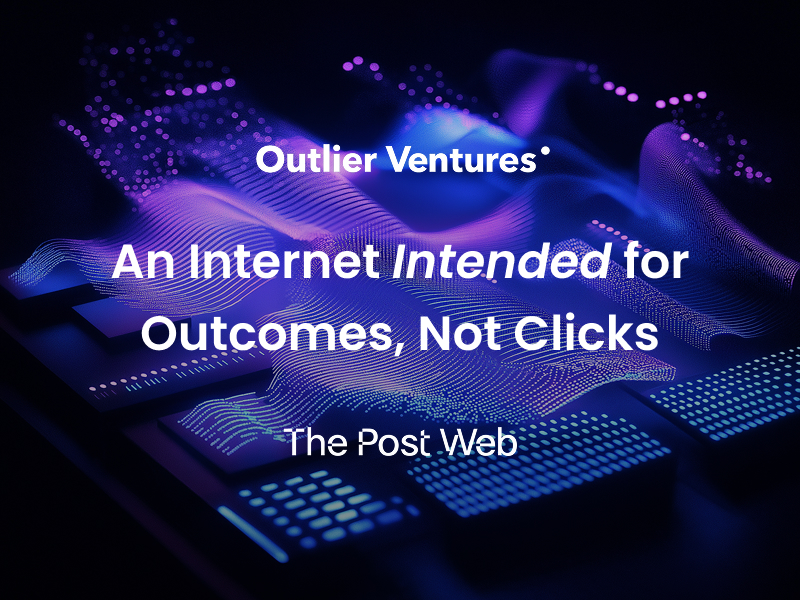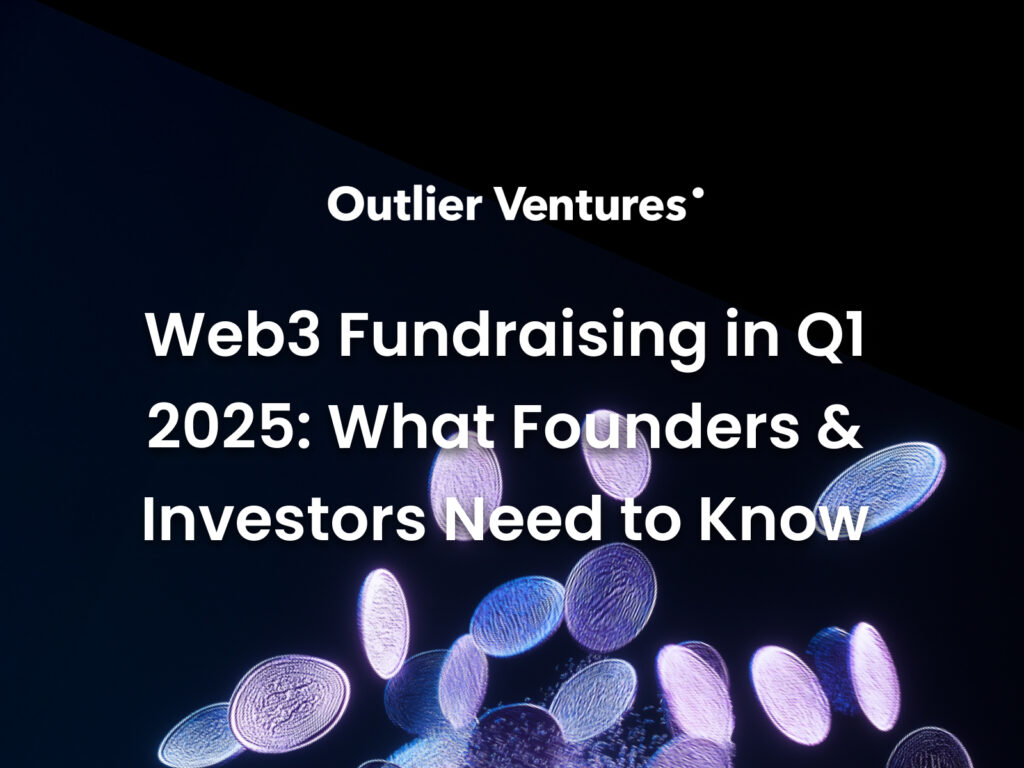Foreword
Since we started investing in 2014, and through the 180+ startups we have supported since then, Outlier Ventures’ mission has been focused on helping the best founders in the space build the most innovative projects. Our team of 60+ subject matter experts working 1-2-1 with founders at the earliest stages of development has consistently given us a unique glimpse into what the future of Web3 holds.
In early 2021, we published the Open Metaverse OS, our thesis describing the Metaverse as a technology stack, ranging from hardware to the application layer, which enables the seamless connection between the physical and digital worlds. We advocated for an open and permissionless Metaverse technology stack that would be the key to making Web3 mainstream. While many of the aspects of the Open Metaverse OS have played out, we still see a gap in critical pieces of the open technology stack needed to onboard the next billion users to Web3.
We have been closely following the developments in Zero Knowledge (ZK) proofs and in particular their applications in the blockchain space over the last few years. We see ZK proofs as a key enabler for the onboarding of the next billion users and pivotal to unleashing the next generation of applications, via increased performance through roll-ups and also through bringing a privacy layer to Web3. In Q1 2022, as part of our mission to support the most innovative founders, we ran a dedicated accelerator program for teams building Zero-Knowledge proofs. In Q3, we will once again be investing in and offering tailored support to the best ZK founders that align with our vision of an ever-growing, open and permissionless Web3.
As part of the accelerator program, founders will gain access to our top-tier partners within the ZK ecosystem, which will be announced shortly, our 60+ crypto native in-house experts as well as our 400+ network of key opinion leaders, experts, and operators across Web3.
Why ZK?
Despite Web 3 becoming more mainstream, the resource-constrained nature of blockchain is more apparent than ever, playing a direct challenge to onboarding the next generation of users. High gas fees, low throughput, and a lack of privacy have created poor UX. The result is limited types of applications that can be built on top of blockchains.
Enter Zero Knowledge (ZK) Proofs – a handy piece of cryptography that can transform any statement into a mathematically-derived proof, the truth of which can be verified by a third party without revealing the actual statement. In practice, ZK proofs allow for computation to be completed off-chain and then verified by the blockchain as being correct, enabling resource-constrained blockchains to scale.
As the name suggests, ZK proofs are able to be proven with no knowledge of the underlying statement, offering another clear advantage over fully-transparent blockchains. While public record keeping is very helpful for certain types of applications, exposing one’s entire on-chain history limits the types of interactions and transactions people and organizations are willing to have in Web3.
ZK proofs have applications beyond blockchains. They can play a crucial role in enabling a new type of authentication. Proving attributes about oneself (such as tax status, KYC status, affiliation with a certain group etc…) without revealing your identity can allow one to access services while keeping personally identifying information private. This protects individuals from the potential influence and manipulation of large data aggregators and maintains privacy. Ultimately, this is a major promise that blockchains have espoused since day 1, removing intermediaries and returning sovereignty to users.
Finally, ZK proofs have the potential to create a new standard of accountability for centralized actors – keeping them honest. Governments, centralized exchanges and block producers will have the ability to prove to their stakeholders that they are delivering on their promises in an easily verifiable manner, without having to reveal all of their inner workings.
Why now?
Until recently, these proofs were computationally expensive to verify, which made their application limited. However, recent advancements such as zk-SNARKs and zk-STARKs have made it easier for blockchain execution environments to verify these cryptographic proofs. Resource-constrained blockchains can offload more computationally intensive tasks and verify that these tasks were done in accordance with the previous state of the chain without compromising on security and decentralization. ZK proofs are poised to become the standard for this type of verifiable computation.
In order for decentralization and self-sovereignty to spread to the next billion users and become standard within the Web, blockchains need scalability and privacy, both of which can be achieved by leveraging ZK proofs.
ZK proofs are a “burgeoning” technology (although it dates back to the 1980s) that is gathering a lot of attention for the reasons outlined above. However, it is still in a nascent stage in terms of application. Due to recent advancements such as STARKs, Noir, and zkEVM announcements, the barriers to entry for builders are lowering, and we expect a new wave of user-facing applications leveraging ZK technology to usher in.
Our thesis
We expect three broad verticals to encompass the majority of innovation happening in the ZK space over the short-to-medium term: Infrastructure, Scaling, & Privacy. Together, these 3 categories will work to create a positive feedback loop – each informing the development of the others as they become battle-tested in the demanding, hostile, and permissionless environment that is Web3.
Infrastructure – Laying the bedrock for the adoption of ZK technology:
Despite the recent ZK primitives advancements and lowered barriers to entry mentioned above, ZK proofs can still be expensive to generate and verify, making it difficult for time-sensitive applications to be built on top of them. Therefore, we expect continuous innovation in ZK Infrastructure. Builders will continue taking feedback from early adopters of ZK technology to build new and improved developer tools that service the new types of ZK applications being pioneered by builders within the Scaling & Privacy verticals.
Potential infrastructure use-cases:
- Interoperability-enabling infrastructure including bridges, omnichains, and stateproofs
- Developer tools for ZK integrations
- Infrastructure enabling censorship resistance and decentralization
Scaling – Leveraging verifiable computation to scale:
Leveraging the off-chain, verifiable computation power of validity rollups will enable applications to service more users. This reduces friction in the Web3 UX through increased throughput, lower gas fees, and faster settlement. Builders within the scaling vertical are already building in testnets or actively thinking about how they can decentralize a Web2 business with the newfound scalability of blockchains.
Potential scaling use-cases:
- Applications expanding the scope of off-chain communication
- Ephemeral Execution environments on ZK rollups
Privacy: – Bringing privacy & identity to Web3:
The Privacy vertical covers the Web3 Privacy layer but also applications beyond blockchain. Applications leveraging the “zero knowledge” part of ZK proofs will allow individuals and organizations to choose what information they share with the world, whether it be financial statements or business logic, still gaining access to services, whether on-chain or in the real world. The privacy layer will enable the convergence of Web3, Web2, and the physical world into a cohesive, blockchain and ZK-powered Web.
Potential Privacy Use-Cases:
- Decentralized identity verification and proof
- Tools which bring identity tools from Web2 to Web3
- ZK Compliance tools
How to participate
Applications for our Q3 2023 Zero Knowledge accelerator program are open and we encourage any founders leveraging ZK technology to reach out to us. Whether it’s building your own ZK proofs or leveraging other existing solutions. We will be evaluating and investing in teams on a rolling basis. If you have any questions feel free to book one of our office hours here or send an email directly to investment@outlierventures.io




